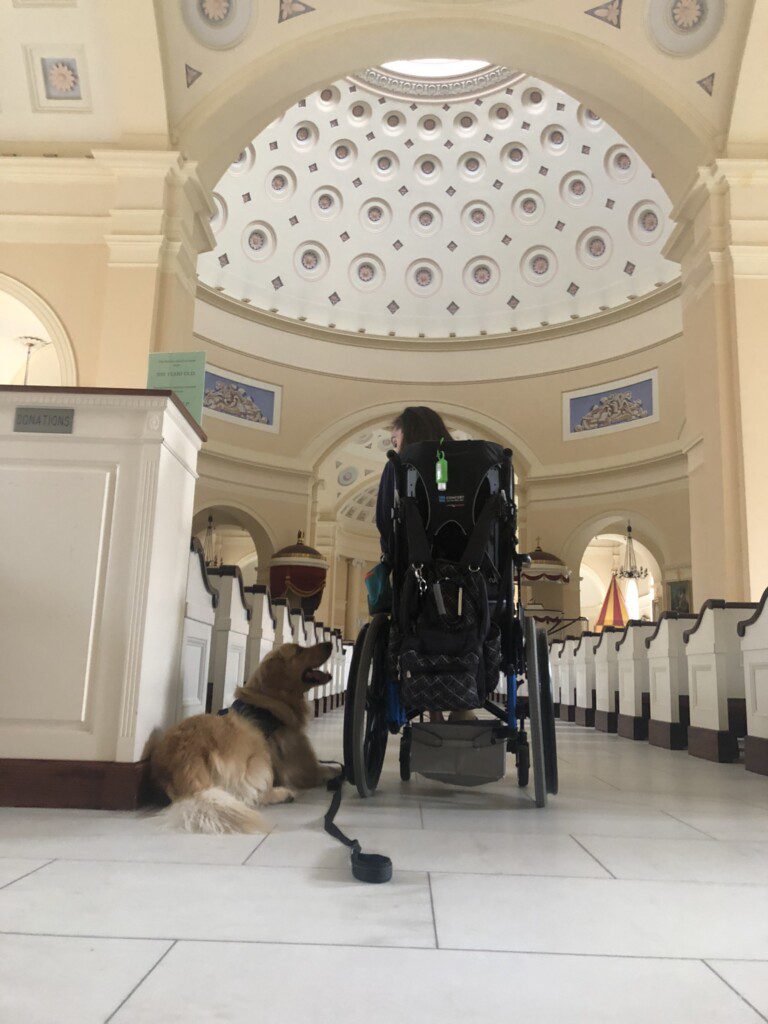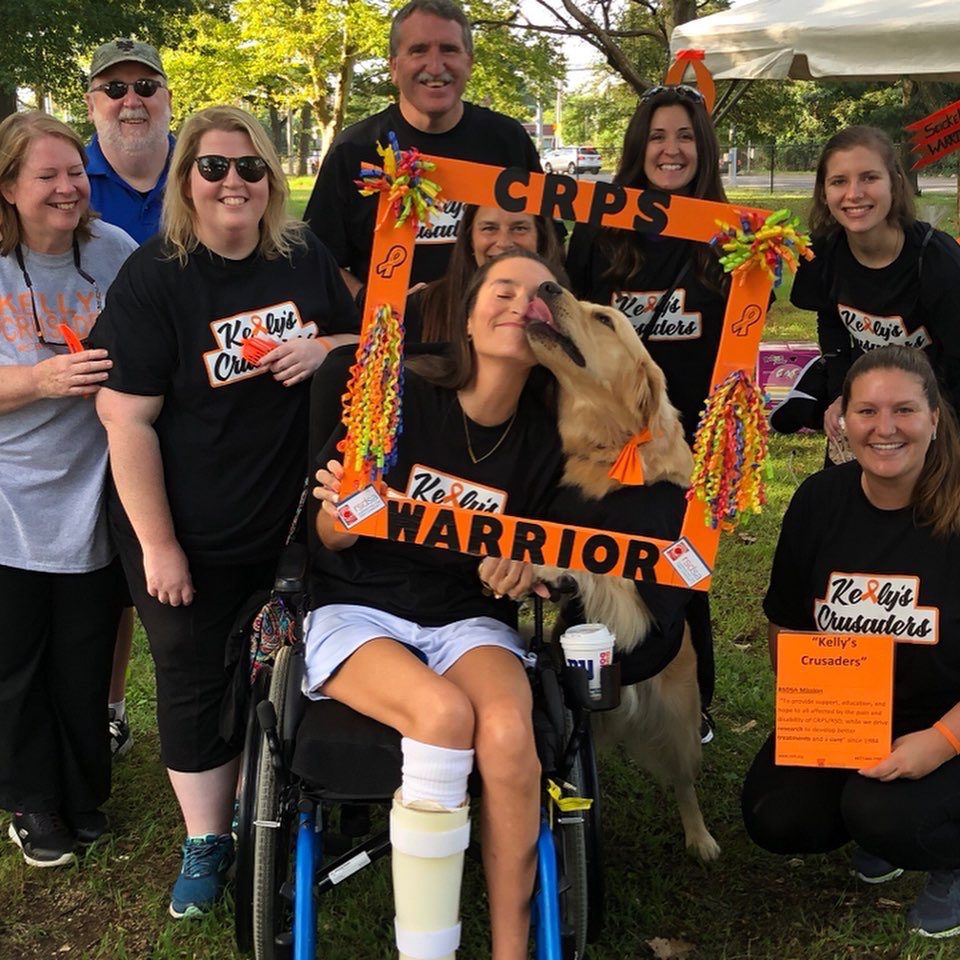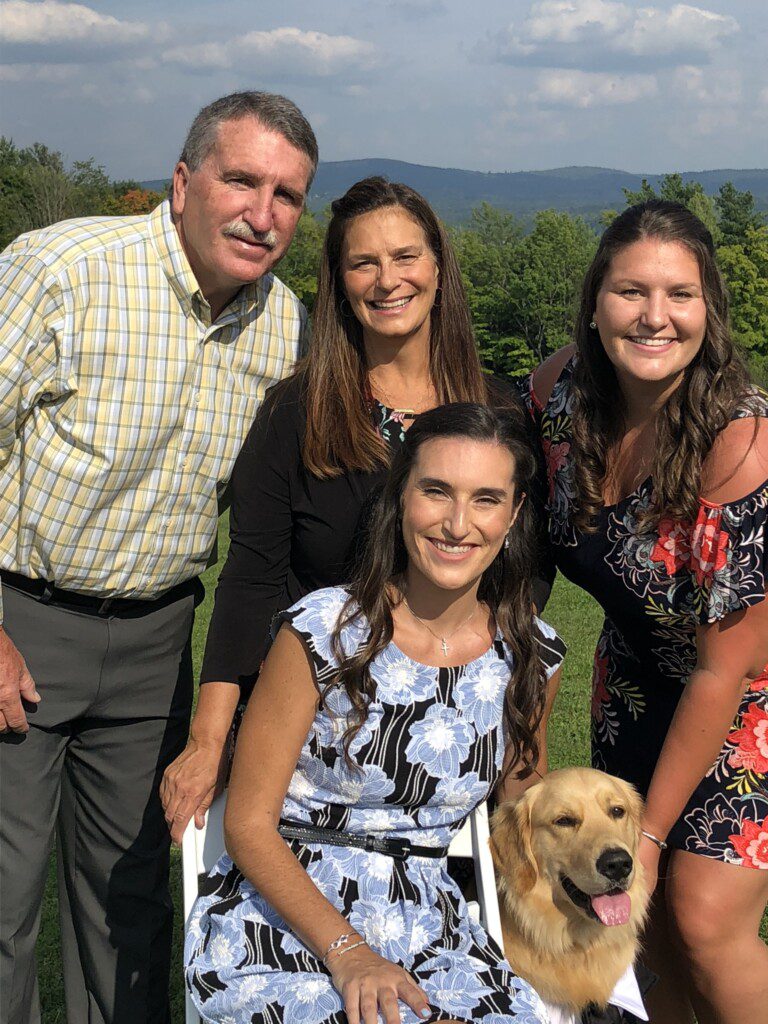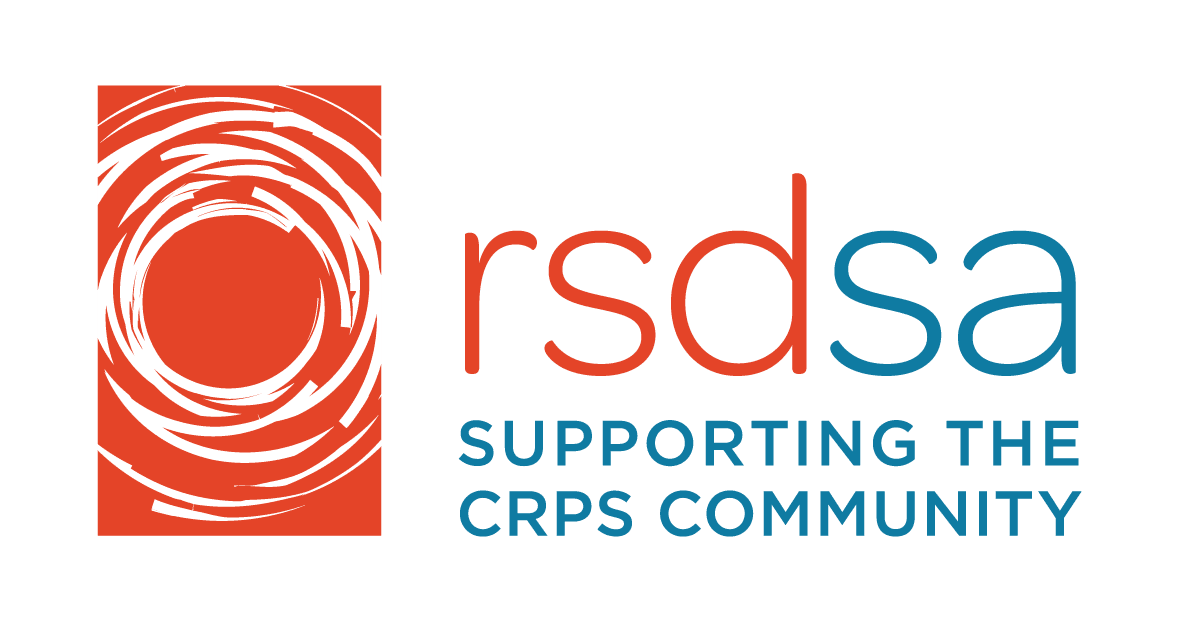Written by Kelly Considine for the RSDSA blog.
 How and when did you develop CRPS?
How and when did you develop CRPS?
Imagine being turned away from doctors when they learn of your CRPS diagnosis.
Imagine being told you would be better off having cancer.
Imagine not one, but several doctors recommending an amputation when they do not fully understand the underlying issue.
These are just a few of the things I have faced after being diagnosed with Complex Regional Pain Syndrome (CRPS).
On September 5, 2005, the first week of my senior year in high school, my life changed forever after spraining my ankle playing volleyball. I had sprained my ankle and suffered various sports injuries growing up, so I was very upset when I quickly learned this was not a typical sprain, and instead of the pain improving, it was actually worsening in intensity and spreading to a larger area. After various x-rays, bone scans, and nerve conduction tests, I was diagnosed with CPRS, a condition I had never heard of. My doctors believe that I pinched a nerve which setoff the CRPS cascade.
What has daily life been like since your diagnosis?
My CRPS diagnosis came at a crucial time in my life. I should have been excited about senior year, graduation, and picking a college, but instead, I was consumed with countless doctors and physical therapy appointments.
Instead of attending my dream school, I had to pick a college that would meet my accessibility needs. During school break when everyone was looking forward to resting, I was busy with procedures and surgeries so I would not miss class. Every semester I shed tears trying to decide if I should return to school or take time off to heal. I am proud to say I returned to college every semester and within five years I earned two Bachelor’s Degrees in Biology and Chemistry, three Minors, and a Master’s Degree in Chemistry.
After my injury, gone were the days of playing sports, something that I had grown up doing. It was difficult to adjust to life on the sidelines where I was keeping stats and cheering on my teammates instead of being on the court. I did not know it at the time, but this was just the tip of the iceberg when it came to the adjustments that would need to be made to adapt to life with CRPS.

I quickly learned that living with CRPS involved more than just pain. Everything in my life is strategically planned to minimize my pain. For instance, showers are never enjoyable because even the softest cloth feels like I am using sand paper, and the running water causes excruciating pain so I must submerge my injured leg in a bucket of water so I do not feel the flowing water. Even wearing pants is painful when the fabric rubs against my leg. Going out in the wind feels like I am being kicked in the shin so I wear an AFO for protection.
Living with CRPS often leaves me feeling like a guinea pig because there is no cure so the best that can be done is to treat the symptoms with medications or physical therapy. There is no good option as medications come with side effects, and PT is exhausting and painful.
I have been riddled with other diagnosis including:
- Gastroparesis – food sits in my stomach because it is essentially paralyzed which has led to anemia and extreme weight loss causing me to rely on a feeding tube and a catheter in my chest to obtain nutrition
- Postural Orthostatic Tachycardia Syndrome (POTS) – inability of my body to regulate blood pressure and heart rate leading to dizziness which makes standing nearly impossible because it results in fainting
- Small Fiber Polyneuropathy – over 99% of females my age have a higher nerve count than me and doctors have looked into autoimmune conditions but all of the tests have been negative which leads to more testing, more waiting, and more referrals as I get passed from doctor to doctor when they feel my case is beyond their scope of care
- Ehlers Danlos Syndrome (EDS) – hypermobile joints that increase my risk of injury
- Autonomic Dysfunction (Dysautonomia) – poor regulation of the autonomic nervous system which controls breathing, blood pressure, heart rate, digestion, temperature, and more causing me to experience lightheadedness, dizziness, low blood pressure, fainting, weakness, and a loss of appetite
- Osteoporosis – weak, brittle bones
- Raynaud’s Phenomenon – abnormal spasm of the blood vessels which decreases the blood supply to the local tissues causing temperature changes and skin discoloration
- Compromised Immune System – low white blood cell and other immune cell counts
Unfortunately, procedures/surgeries often caused my pain to spread. After one surgery I developed a movement disorder that made it impossible to do everyday tasks. My mom quit her job and moved to an apartment near my college to help me with the things I could no longer do. I am beyond thankful because without this sacrifice, I never would have been able to finish my degrees. Even today, at 31, I need help brushing my hair, buttoning/zipping clothing, and tying my shoes. I have had to adapt how to hold/grip pens, pencils, utensils, cups, etc. So much thought goes into doing basic, everyday tasks.
 What is one thing you wish those without CRPS/RSD could understand?
What is one thing you wish those without CRPS/RSD could understand?
I wish people understood that every day is a battle between what I can physically do and what I wish I could do. After my diagnosis, I lost a lot of friends who did not understand that I could not keep up with everyone as I once could due to the constant, excruciating pain. Do not be afraid to ask questions to learn more about CRPS. Ignorant individuals have accused me of faking my condition for attention because CRPS is an invisible disability so you cannot see my pain and suffering or the daily battles I face. Imagine being told the pain is all in your head or being doubted by your doctors, family, and friends. I am not a “faker” or “attention seeker.” It is frustrating having to prove the severity of my pain. Twenty four hours a day, seven days a week I am reminded of my CRPS, and I still find it unbelievable that such a horrible condition exists.
Being told “you look great” can be a compliment, but it is also very frustrating. People do not see how much time I spent on my hair and makeup to look “healthy,” and they do not see that after a function I crawl back into bed. I have countless, sleepless nights, but every day I have to get up and go about my commitments like usual. People don’t see how much effort I put into every single task because I always put on a smile and try to be present and enjoy the moment.
I always share the “good” days on social media, but people rarely see the other days. There are times I don’t even have the energy to reply to a text message, some days I have throbbing pain above my baseline, and other days I may black out from blood pressure issues. I never have an appetite and eating causes extreme pain and nausea, but I set alarms to remind myself to eat because I know I need the nutrition. Through it all I persevere. I have accepted that I am going to have good days and bad days. For everyone that stays for the good and the bad, thank you for sticking with me through it all. I know the bad days will pass, and I have a group of amazing people who are waiting there to support me! Showing compassion or sending a text to check in goes a long way! It reminds me of my wonderful support system who never lets me face these obstacles alone.
I have been lucky enough to have the most supportive friend who has been by my side since the beginning. When I was in the hospital for three weeks, she took time off of work to stay with me. She was aware of the McGill pain scale which ranks CRPS pain higher than childbirth, so when she gave birth to her son she held off on receiving medication so she could experience just a little of the pain that I feel 24/7. I would never wish my pain upon anyone, but for her to think of me and try to walk in my shoes is true friendship!
I wish others understood the planning that goes into just leaving the house. It is essentially like packing a diaper bag because I need to think about food, medicine, bathroom accessibility, how crowded it will be, etc. Before I get to an event I am drained from packing and getting ready. Going to an event may increase my pain and exhaustion meaning that I have to forgo plans/activities later in the week. It is all about finding the perfect balance. I still want to have an active social life, but I can’t let that compromise my health because pushing myself too hard makes it difficult to recover.
What advice would you give to newly diagnosed Warriors?
I would advise recently diagnosed CRPS Warriors to do your research! You have to feel comfortable with your treatment plan so it is ok to say no to a doctor’s suggestion.
For instance, one doctor recommend alcohol injections to kill the nerve endings, but my research revealed that it also damages and kills the surrounding, healthy tissue and muscle so I did not proceed with this option.
On another occasion, my doctor suggested a ketamine infusion but misled us when he said I had about an 80% chance of improvement. I wanted to proceed, but my dad had a gut feeling and could not let me go through with the treatment. He called the doctor to let him know of his apprehensions, and we were told it was a good choice since I only had a 30% chance of improvement.
Unfortunately, over time my foot became contracted and was constantly pointed. Three different orthopedic surgeons recommended an amputation which I knew was not a viable option as it can cause the nerve pain to spread. Another doctor wanted to do an ankle fusion, and yet another wanted to lengthen my tendons as an outpatient procedure. Having previous surgeries, I knew I needed several nerve blocks to prevent the spread of my CRPS, and when I brought this up to the doctor he said it was a great idea which did not sit well with me because I should not be the one outlining the surgical plan. I knew he was not the right physician for me.
NEVER proceed if you are uncomfortable with the treatment plan your healthcare team proposes. Do not be afraid to get second, third, or more opinions, ask lots of questions, and always speak up for yourself!
What advice would you give to Warriors who have had CRPS/RSD for many years?
To the veteran Warriors who have battled CRPS/RSD for many years, I would say don’t give up. As the days, weeks, and years continue to pass by, we have to stay positive. It is easy to look back at how long we have struggled with CRPS and get discouraged. It is important to find something you are truly passionate about to help you get through your difficult days. It is ok to feel sorry for yourself, and ask “why me?”, but dwelling on these feelings can be detrimental to progress. Always hold your head high! You may not have achieved the dreams you hoped for, but it is ok to make new goals. Celebrate every accomplishment! When you have lived with CRPS/RSD for many years, your days are filled with doctors appointments, physical therapy, calls to insurance, timed medications, and more, but do not forget to make time to recharge. Listen to your body because every day will be different. Take it easy when your body tells you to rest, and enjoy yourself and let loose when your body decides to cooperate! There will always be good and bad days, so when a good day comes along, take the win. When you experience the bad days, it is ok to make your health a priority.
Walk away from the people and situations that bring you down. Living with chronic illness for an extended period of time allows people to show their true colors. Certain friends and family members will surprise you in amazing ways and really step up to support you, but at the same time some people will walk away and let you down. Do not exert your energy on a one sided relationship as you deserve so much more! CRPS may have taken away certain relationships, but that just meant it allowed the truly valuable and genuine friendships to flourish! Never be afraid to ask for help if you find yourself struggling mentally or physically!
Never lose your identity… you are not your illness, you are so much more! CRPS has interfered with many of the things I have loved, and I have not YET achieved my dream career, but it has not stolen my spirit and persistence. As I write this and reflect back on my experience with CRPS, I realize that I have lived almost 5200 days in pain after suffering my initial injury.
CRPS may have changed my world, but it hasn’t changed me. It has taught me to work harder to achieve my dreams and to truly appreciate the positive things. CRPS has brought me my darkest days, but in turn, it has illuminated some of my happiest memories. Always remember to reflect on your accomplishments because they are that much more special knowing what you have achieved despite the challenges you have faced.

What activities or treatments have helped you find temporary or long term relief?
I have found some pain relief with medications and my spinal cord stimulator, and I found aquatic therapy to be more beneficial than land based PT, but unfortunately I have not found the “magic” fix that offers me the relief I dream of. I hope that increased awareness and research leads to a cure/treatment in the near future!
The best thing to have happened to me since my injury occurred two years ago when my life changed in such a positive way after adding my Golden Retriever, Gunner, to the family. I have discovered that working with Gunner and training him to be my service dog helps take my mind off of the pain and struggles of the day. I decided to self-train Gunner because there was a two year waitlist and a $25,000 price tag for a trained service dog. At nine weeks old Gunner immediately approached my wheelchair and quickly fell asleep in my lap. My mom, dad, and I were in agreement that this was the puppy for me… he picked me! I decided to name him Gunner which means battle strong and bold warrior because I knew he would help me overcome any obstacles that stood in my way. Prior to brining Gunner home I wouldn’t get out of bed on bad days, but I can no longer do that because he deserves attention and it is not fair to ignore him when I am not feeling well! He absolutely loves training and playing, and he helps keep me motivated to get up and be active. He gives me great purpose which is crucial when your world is consumed with chronic illness. Gunner just turned two and already knows so many commands including:
- Retrieving medication and water from the cabinet and refrigerator, respectively
- Opening and closing doors
- Turning the lights on and off
- Finding help and getting someone to follow him to me
- Applying deep pressure therapy to help control my blood pressure
- Alerting me to changes in blood sugar and blood pressure
- Nudging my hand when I start scratching (I have such bad nerve loss that I start bleeding without even realizing it, so Gunner stops me before it gets to that point)
- Crawling under my legs and lifting them to restore blood flow to my brain if I pass out
- And so much more!
He is always looking to learn something new! He gives me great purpose which is so crucial when your world is consumed with chronic illness.
If you would like to follow our adventures, you can find us on Instagram at @gunner_the_golden_boy, YouTube at , and Facebook at !

What else would you like to add?
Here are 14 tips that I want to share with other warriors. These are things I have learned along the way, one for each year I have suffered with CRPS:
- Be your own advocate!
- Keep your head held high through the ups and the downs, but always look for the positives regardless of the obstacles you face.
- It is ok to say no to plans and make your health a priority.
- Listen to your body, you know what you are capable of.
- People struggle to understand because you are suffering from an INVISIBLE illness.
- You are not a failure; you’ve only failed if you have given up, so keep persevering.
- Keep fighting and following your dreams because you can still live a fulfilling life with chronic illness!
- Surround yourself with people that will lift you up, make you laugh, get you through the tough days, and celebrate the good days!
- Don’t be afraid to ask for help, your true friends will become apparent when you need them most. You will lose friends along the way, but that just makes room for the genuine people in your life!
- Find what makes you happy and helps distract you from the pain.
- Smile through the good and the bad. Smiling releases neurotransmitters that can improve our mood, relax our bodies, and reduce physical pain!
- Be proud of yourself! Each and every day you accomplish so much, even if it just means getting through the day when your symptoms are especially bad.
- Find people that support you not those who sympathize with you. Battling CRPS is like climbing a mountain. When you are standing at the bottom it looks overwhelming but once you start climbing and have people cheering you along you can push through any obstacle you face, so keep climbing!
- Tell your story to anyone who is willing to listen because only through our own experiences can we bring awareness to invisible illnesses.
Stay strong warriors!
Please consider making a donation to RSDSA today!
